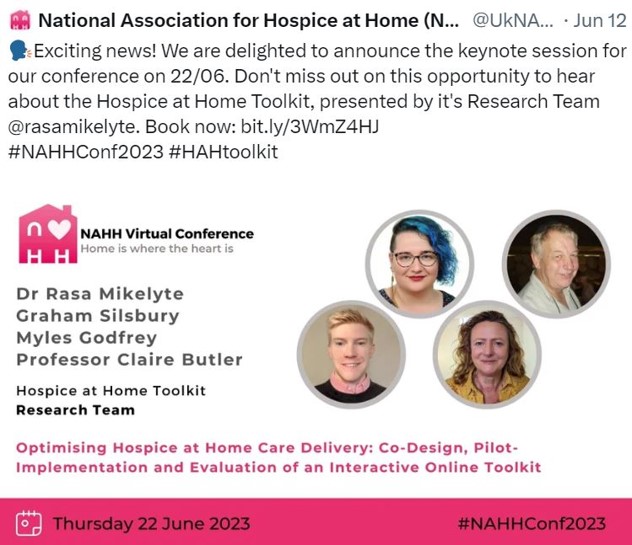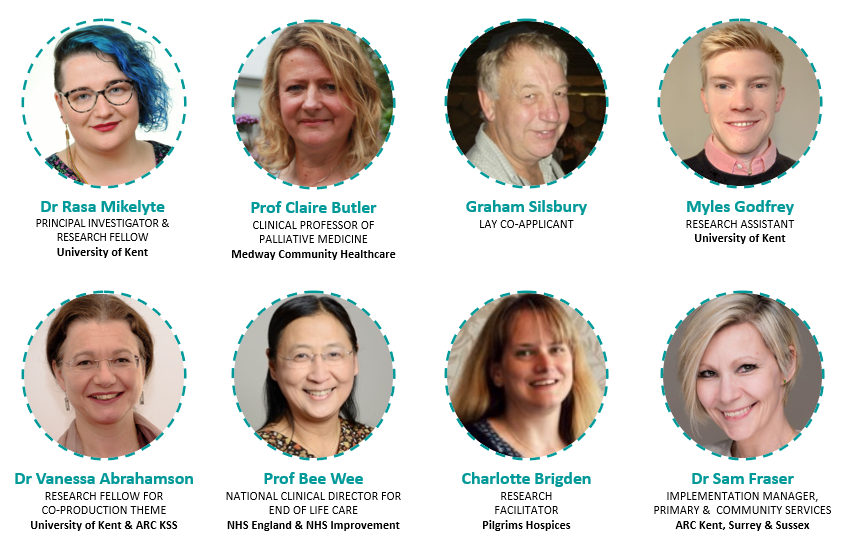Designing, piloting and evaluating an interactive online toolkit for optimising Hospice at Home care delivery
Dr Rasa Mikelyte, Principal Investigator
Read about the project, or go right to the Hospice at Home Toolkit.
Why have we designed the toolkit?
The aim of palliative care is to improve the quality of life of people who have an incurable illness, up to the point of death. This includes medical, emotional, social, practical, psychological, and spiritual care, as well as addressing the needs of the person’s family and carers. For many people, dying at home is an important priority and services called “Hospice at Home” (HAH) or similar have been developed across the UK to support people to achieve this.
Results from a national evaluation of Hospice at Home services (undertaken 2017-2021) produced evidence on the key factors which need to come together in each HAH to provide the best possible care. These findings were presented at Consensus Events with service providers, members of the public and commissioners in January 2020. Attendees strongly recommended the development of an implementation tool, available in a user-friendly, interactive manner, with concrete guidance for Hospice at Home services to use to improve practice and patient care.
What does the Hospice at Home Toolkit offer?
The toolkit allows service providers to map their service across a number of key areas, which in turn produce tailored guidance on effective improvements specific to each service and local area. Content aimed at patients, informal carers and service commissioners (e.g. as infographic summaries and short videos) is part of the toolkit.
Would like to know more? Watch our video:
How was the toolkit designed?
The toolkit was co-produced by researchers, practitioners and the public working together, as well as sharing power and responsibility from the start to the end of the research project. The project team consulted members of the public with experience of palliative care and service providers at every stage of this study. Stakeholders were at the centre of toolkit design, refinement, and pilot implementation.
Read a short project summary here.
How do we know if the toolkit is effective?
We pilot-implemented the toolkit with 10 Hospice at Home teams in England and one in Canada. We found the toolkit to be helpful to charity-sector as well as NHS-run hospice at home teams. It benefitted not only established organisations, but also ones who wished to start a new service.
“It is a powerful and useful tool” (S1P03, Head of Nursing
at a hospice)
“[The toolkit] will be beneficial to improve
and expand hospice at home services” (S4P08, HAH team leader)
“[The toolkit is] concise, succinct and signposts you
to other areas so you can pick what is relevant to
you if want to know more” (PPI02, member of the public)
How will Hospice at Home providers learn about the Hospice at Home toolkit?
After the evaluation is complete, we will:
- Host a series of Webinars for the public, HAH service providers, and service commisioners/funders/leaders.
- Take the toolkit on an Online Hospice at Home Toolkit Roadshow. The virtual roadshow will enable individual HAH teams to invite our team to showcase the toolkit, present findings from pilot-implementation and its evaluation, and answer emerging queries.
We have also advertised the toolkit to researchers and providers at national and international conferences, including:
- Presentation: ARC KSS Winter Symposium – 9 Feb 2023

- Presentation: CRN KSS Cancer Supportive & Palliative Care Event – 2 March 2023
- Posters x2: European Association for Palliative Care Conference – 15-17 June 2023
- Keynote presentation: NAHH annual conference – 22 June 2023
- Presentation: ARC KSS Board – 22 June 2023
- Poster x1: Health Services Research UK Conference – 4-6th Jul 2023
How did the project progress?
There were 5 stages to the project:
- Co-Designing the toolkit. A co-production event was held with stakeholders to design the toolkit based on findings from the previous national evaluation and stakeholder expertise
- Refining the toolkit based on feedback from a stakeholder consultation event on the demo version of the toolkit
- Releasing the toolkit as a pilot among palliative care providers in Kent, Surrey and Sussex, identified and supported through the research team’s established networks
- Evaluating the usability, value and impact of the toolkit with short surveys and in-depth interviews
- Further refining and widely advertising the toolkit to diverse audiences (including webinars and a virtual Hospice at Home toolkit roadshow)
Who was working on the project?
Working together with practitioners and the public was central to all activities of the project. Your help was integral to designing, refining and piloting the Hospice at Home toolkit.
Meet the project team:
This project was a partnership of:
Who funded the project?
This project has been funded by the National Institute for Health Research (NIHR) Applied Research Collaboration for Kent Surrey and Sussex (ARC KSS) and Medway Community Healthcare.
Who can I contact for more information?
If you would like to get involved in the project or if you have any questions and comments, please contact Rasa Mikelyte on R.Mikelyte@kent.ac.uk